Student Union
- By Bruce Alpert
Older Republicans Say College Has Negative Impact on US
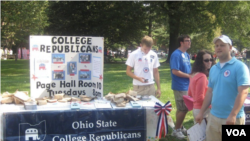
But a majority of younger Republicans and Republican-leaners aged 18 to 29 say colleges have a positive effect on the country.
Over the past two years, Pew Research Center found that the share of Republicans and Republican leaners who view the impact of colleges and universities positively has declined 18 percentage points, from 54 percent to 36 percent.
Democrats and Democratic-leaning independents view the value of colleges and universities very differently. Pew said 72 percent of Democrats and Democratic-leaners say colleges have a positive effect on the United States -- little changed from recent years.
David Andersen, who teaches political science at Iowa State University, said he is not surprised Republicans and Republican-leaning adults have a negative opinion of American higher-education.
“One of the things going on is that there is an anti-elitism and intellectualism among some in the Republican Party,” Andersen said.
Violent demonstrations at some colleges such as the University of California-Berkeley and Middlebury College in Vermont against conservative speakers could have an impact, too. Andersen said the demonstrations drew wide coverage and criticism by news media favored by conservatives.
Andersen said he sees distrust in his own classroom among students from largely Republican and conservative communities in Iowa.
“Students are very willing to push back as we discuss issues,” he said. “But that’s the whole point of being at a university. Let’s talk about what you believe and see how it matches up with the facts."
On some issues, such as climate change, Andersen offers information about the big majority of scientists who say climate change is real and caused by man-made activities.
About taxes, Andersen said he has discussed with students the “trickle down” theory espoused by Republican president Ronald Reagan with students who are in favor of it. That theory suggests tax cuts to corporations and the wealthy will result in more spending and generate economic growth for the country.
Some economists like Jared Bernstein, senior fellow at the liberal Center on Budget and Policy Priorities, disagree. Bernstein says reducing taxes for the wealthy reduces government revenue and adds to income disparity between rich and poor.
When they get home, some students talk with their parents about classroom discussions that conflict with the ones at home.
Andersen said some students face accusations of disloyalty.
“One student said ‘My uncle yelled at me for two hours because he thought I had become a godless liberal,’” Andersen said.
Andersen said he believes that most Americans without a college education want their children to go to college, hoping they will gain better job opportunities.
William Eveland Jr., a professor at the School of Communication and the Department of Political Science at Ohio State University, said there may be other reasons Republicans do not favor colleges and universities.
“As tuition rises due in part due to reductions in state funding, the risk of students going into debt and not getting their money's worth increases,” Eveland said.
The Pew Research Center survey found Republicans have an even worse opinion of the news media than they do of American colleges. Pew found that 85 percent of Republicans and people who lean Republican say the news media has a negative effect on the United States.
Democrats and Democratic-leaning adults are divided -- with 44 percent saying the news media has a positive effect and 46 percent saying it has a negative effect.
Pew said it interviewed 2,504 adults in all 50 U.S. states and the District of Columbia on both land-line telephones and cell phones. Interviews were conducted June 8-18 in English and Spanish, Pew said.
Pew Research Center describes itself as “nonpartisan fact tank that informs the public about the issues, attitudes and trends shaping America and the world. It does not take policy positions. It conducts public opinion polling, demographic research, content analysis and other data-driven social science research.”
Please leave a comment here, and visit us on Facebook, Twitter, Instagram and LinkedIn, thanks!
See all News Updates of the Day
With federal student aid delays, students aren’t sure what college will cost
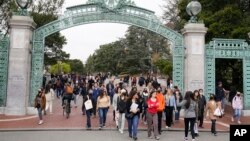
The U.S. Department of Education’s federal student aid form (FAFSA) experienced serious glitches and delays this year.
Now, many students have been admitted to college, but don’t know how much money they’ll need to attend.
Read the story from Susan Svrluga and Danielle Douglas-Gabriel for The Washington Post. (March 2024)
Senator draws attention to universities that haven’t returned remains
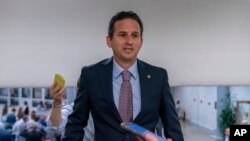
More than 70 U.S. universities continue to hold human remains taken from Native American burial sites, although those remains were supposed to be returned 30 years ago.
Jennifer Bendery writes in Huffington Post that one senator has been using his position in an attempt to shame universities into returning remains and artifacts. (April 2024)
COVID forced one international student to go hungry
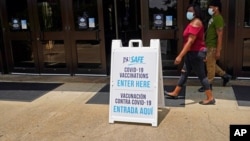
When Samantha (not her real name) enrolled in community college in the U.S., her family at home in South Africa scrimped and saved to support her.
But the COVID-19 pandemic hurt the family’s finances, and at one point Samantha had four on-campus jobs just to make ends meet. Many in the U.S. believe international students are wealthy sources of funding for universities, but stories like Samantha’s suggest otherwise.
Andrea Gutierrez reports for The World. (March 2024)
Tips for paying for a STEM degree as an international student
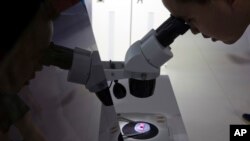
For US News & World Report, Melanie Lockert describes how to calculate the cost of a STEM degree, and where to find funding. (March 2024)
NAIA all but bans its transgender college athletes from women's sports
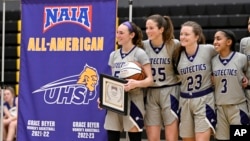
The National Association of Intercollegiate Athletics, the governing body for mostly small colleges, announced a policy Monday that all but bans transgender athletes from competing in women's sports.
The NAIA's Council of Presidents approved the policy in a 20-0 vote. The NAIA, which oversees some 83,000 athletes at schools across the country, is believed to be the first college sports organization to take such a step.
According to the transgender participation policy, all athletes may participate in NAIA-sponsored male sports but only athletes whose biological sex assigned at birth is female and have not begun hormone therapy will be allowed to participate in women's sports.
A student who has begun hormone therapy may participate in activities such as workouts, practices and team activities, but not in interscholastic competition.
"With the exception of competitive cheer and competitive dance, the NAIA created separate categories for male and female participants," the NAIA said. "Each NAIA sport includes some combination of strength, speed and stamina, providing competitive advantages for male student-athletes. As a result, the NAIA policy for transgender student-athletes applies to all sports except for competitive cheer and competitive dance, which are open to all students."
There is no known number of transgender athletes at the high school and college levels, though it is believed to be small. The topic has become a hot-button issue for those for and against transgender athletes competing on girls' and women's sports teams.
At least 24 states have laws barring transgender women and girls from competing in certain women's or girls sports competitions. Last month, more than a dozen current and former college athletes filed a federal lawsuit against the NCAA, accusing the sports governing body for more than 500,000 athletes of violating their rights by allowing transgender women to compete in women's sports.
The Biden administration originally planned to release a new federal Title IX rule — the law forbids discrimination based on sex in education — addressing both campus sexual assault and transgender athletes. But earlier this year, the department decided to split them into separate rules, and the athletics rule now remains in limbo even as the sexual assault policy moves forward.
Hours after the NAIA announcement, the NCAA released a statement: "College sports are the premier stage for women's sports in America and the NCAA will continue to promote Title IX, make unprecedented investments in women's sports and ensure fair competition for all student-athletes in all NCAA championships."
The NCAA has had a policy for transgender athlete participation in place since 2010, which called for one year of testosterone suppression treatment and documented testosterone levels submitted before championship competitions. In 2022, the NCAA revised its policies on transgender athlete participation in an attempt to align with national sport governing bodies, following the lead of the U.S. Olympic and Paralympic Committee.
The three-phase implementation of the policy included a continuation of the 2010 policy, requiring transgender women to be on hormone replacement therapy for at least one year, plus the submission of a hormone-level test before the start of both the regular season and championship events.
The third phase adds national and international sport governing body standards to the NCAA's policy and is scheduled to be implemented for the 2024-25 school year on August 1.
There are some 15.3 million public high school students in the United States and a 2019 study by the CDC estimated 1.8% of them — about 275,000 — are transgender. The number of athletes within that group is much smaller; a 2017 survey by Human Rights Campaign suggested fewer than 15% of all transgender boys and transgender girls play sports.
The number of NAIA transgender athletes would be far smaller.






